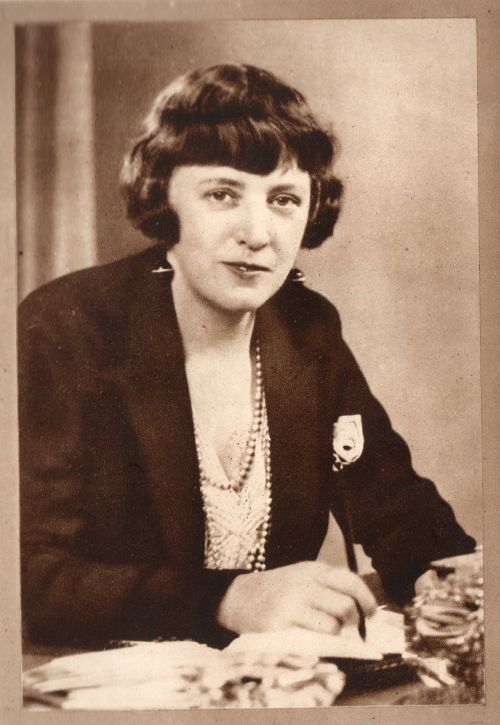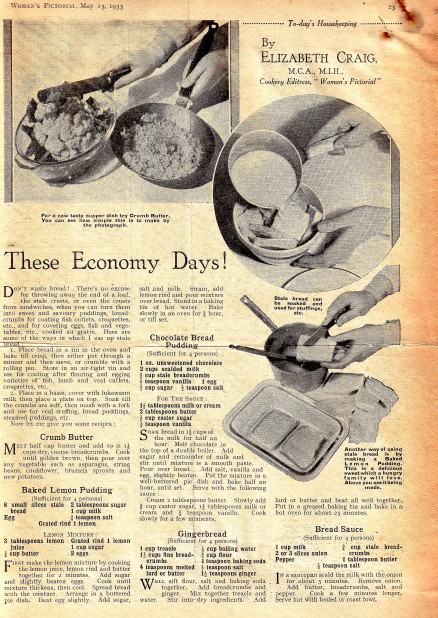Elizabeth Craig, Rock Star of Culinary Literature
“I’ll take no excuse for a want of variety in meals. ‘Keep out of the rut’ is a motto that should hang in every kitchen. Come along everybody. Let’s do our bit. Armed with wooden spoon, basin, and saucepan we’ll keep the pots boiling whatever happens.”
— Elizabeth Craig, introduction to Cooking in Wartime (1941)
Few figures in the history of culinary literature have had such long careers as Elizabeth Craig. The Scottish journalist began writing before World War I and continued for many decades. Examining Craig’s body of work reveals much about how foodways have evolved thanks to the influence of historic events and new technologies.
Elizabeth Josephine Craig was born on February 16, 1883. She was one of eight children, and her father was a clergyman for the Free Church of Scotland. By the time she was six years old, Craig had already found her way to the kitchen. She began collecting recipes when she was only twelve years old. Craig would later write in Instructions to Young Cooks, “by the time I was a teenager, mostly thanks to my mother’s training, I was making all the breads, cakes, and scones for my father, mother, and seven hungry brothers and sisters. It was great fun for me, but not for my busy mother though she never complained.”
Craig studied journalism in Dundee, and quickly established herself as a consummate professional in the field. When the International PEN Award (now called the PEN International) was established in 1921, Craig was one of the founding members. At the request of founder Catharine Dawson Scott, Craig attended the inaugural meeting at London’s Florence restaurant. John Galsworthy was elected the organization’s first president.
Her first published cookery feature appeared in the Daily Express in 1920. She undertook the assignment after an editor at the Daily Mail observed that Craig was “the only woman on Fleet Street who could cook.” Her columns grew quite popular and were frequently reprinted in both the United States and Canada. Prior to the 1920’s, it was relatively rare for cookery columns to include a byline; they were either published anonymously or attributed to “A Housewife” or “A Cook.” Once bylines became more commonplace, the “celebrity chefs” of the era began to emerge: Phillip Harben, Marguerite Patten, Fanny Craddock, and Susan King, along with Craig, of course.
One of the most prolific cookery authors of the time, Craig developed a reputation for providing practical–and frugal–advice on housekeeping and cookery, even before rationing began. The Northern Gazette, in Alberta, said of Craig, “it is her job to show [housewives] how to economize–how to make up dishes which will be tasty as well as nutritious, and her fame has spread far and wide over her soup dishes.” Food manufacturers sought Craig to write promotional recipe books, and in the 1930’s Phoenix Glassware hired her to help design a line of heat-resistant glassware and lend her name to the finished product.
When rationing began during World War II, Craig was uniquely qualified to address the challenges of cooking with limited means and supplies. Rationing had a significant impact on Britain’s food supply and distribution, and it affected people of all social classes. The restrictions on what could be bought and the departure from normal pricing conventions pushed women to innovation. Craig was a voice of inspiration. She wrote in the introduction to Wartime Cooking (1941), “I’ll take no excuse for a want of variety in meals. ‘Keep out of the rut’ is a motto that should hang in every kitchen. Come along everybody. Let’s do our bit. Armed with wooden spoon, basin, and saucepan we’ll keep the pots boiling whatever happens.”Craig’s list of simple kitchen implements points to another condition of cooking during the time period: luxuries like hot water and even multiple pots and pans were not to be found in every kitchen. Electric ranges of the time were still quite slow, and gas was relatively rare.
But that changed during Craig’s career. Refrigerators, freezers, and small kitchen appliances became increasingly common, as did hot water. The 1950’s and 1960’s saw a true metamorphosis of the home kitchen, and Craig kept pace. Over time, her recipes called for more diverse ingredients and took advantage of new kitchen technologies. In 1957, Craig published Collins Family Cookery, an absolutely massive tome chock full of recipes and practical tips. Her husband, war correspondent Arthur Mann, wrote the introduction. He feared that cookery as his wife practiced it was dying. Mann reproaches the “lazy or overburdened housewife” who serves new “pre-fabricated food.” Meanwhile, Craig was clearly reveling in the end of rationing–many of the recipes call for large quantities of eggs, butter, and other basics that were previously in short supply.
Craig remained an active writer throughout her lifetime. Toward the end of her life, when she was in the hospital recovering from a broken hip, she heard that her publisher was planning to find someone else to finish her latest book. Craig reportedly called that proposition “nonsense” and had her notes brought to her in the hospital. She finished the book before passing away on June 7, 1980.
Because Craig was such a prolific author, she’s an excellent focus for collectors of rare cookbooks. Completists strive to build libraries that contain not only all her books, but also her newspaper columns and articles. Meanwhile, the incredible longevity of her career makes Craig a particularly fascinating figure for culinary historians, who find a wealth of information about British foodways throughout the twentieth century in Craig’s works.



Hi Lizzie:)
I am so dumb founded by the fact that I have never stumbled upon your blog before. What an amazing amount of time and energy you have put into all the research you present. I know for a fact it is no easy task although, I must admit, it does seem a bit less time consuming than days gone by.
I enjoyed this piece very much and just had to take a moment to thank you. I am an avid cookbook collector. As amatter of fact, we’ve been celebrating Cookbook Wednesdays on my blog for the past few months.
I think it is such a shame that more information is not readily available about cookbook authors. I try to include them in my blog posts as often as I can especially when I am discussing one of their books.
I’d love to read each and every one of your posts right now but I am in the midst of preparing a calendar of food events for the month of February. I will be including Elizabeth Craig nd a link back to your informative post. I will also be pinning this on Pinterest.
Thank you once again for sharing, Lizzie. I do hope you will be posting again soon. Louise